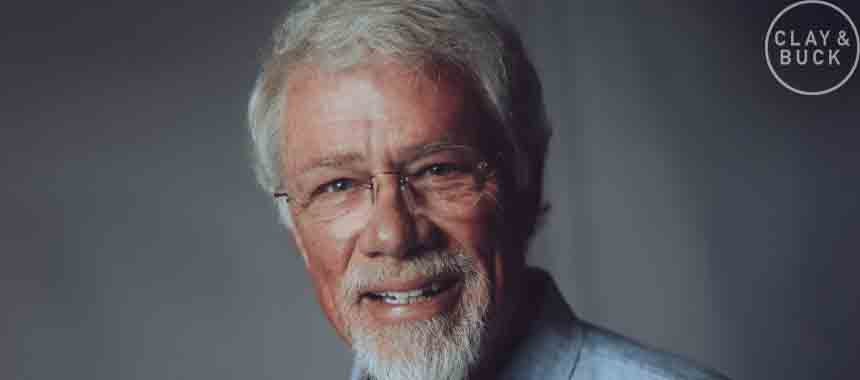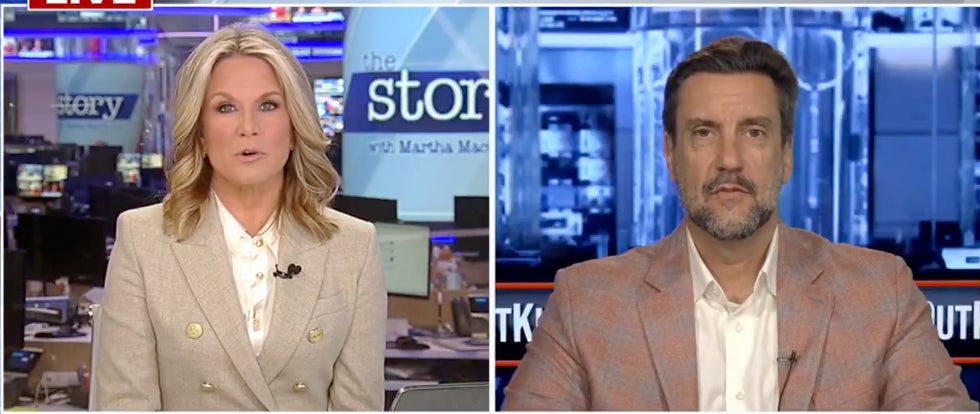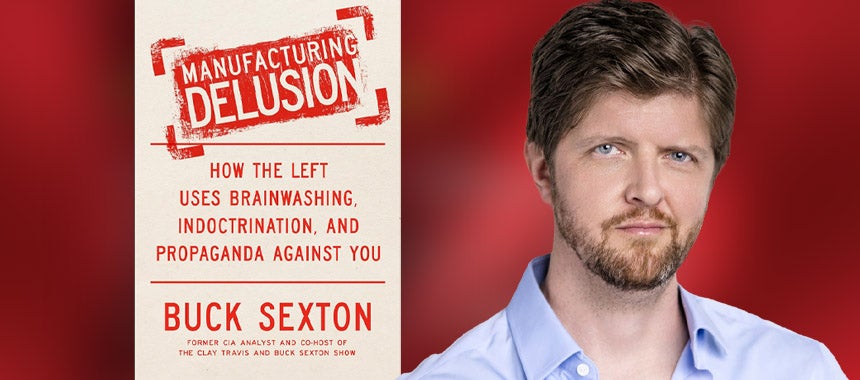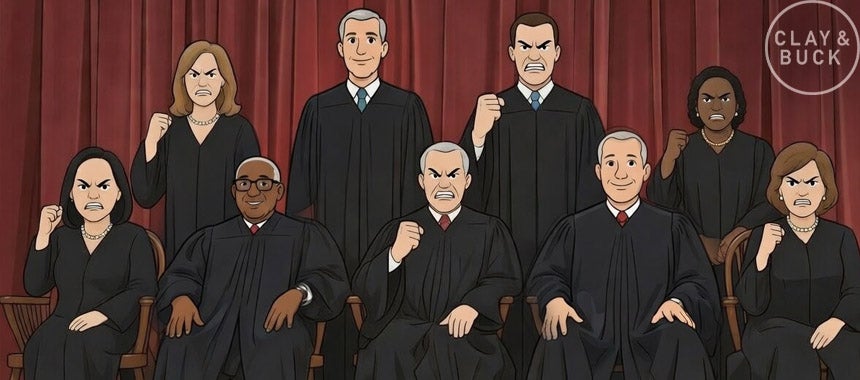Starbucks CEO Blames Store Closures on Democrat Crime Policies
21 Jul 2022
BUCK: There’s this situation we mentioned yesterday of Starbucks is closing stores all — and, you know, I just. I like the egg bites. I’m just going to say it. I’m an egg bite guy.
CLAY: I’ve never had an egg bite.
BUCK: You’ve never had an egg bite? Clay Travis, this is madness. This is delicious.
CLAY: I’m not a breakfast guy. Is this a breakfast food?
BUCK: No. I eat it any time of day. Because, otherwise, it’s like pastries, and I can’t eat flour, obviously, unless I want to get really sick. So the only thing I can really eat is a banana or egg bite that I can get there. But, you know, Starbucks, really, it was the beginning of the nationwide coffee chain revolution. Became a multi, multibillion-dollar business. One of the most recognizable brands, certainly I would say in the United States. Right? And it’s now you see Starbucks all over the world.
They closed 16 stores. Given how many stores they have, may not sound like it’s that big of a number but more are coming. And the reason for the stores coming. And the reality of those stores is yet another indicator of, Democrats are crazy when it comes to crime. They’re crazy on covid. They’re crazy on crime. Here’s what I mean: Howard Schultz, CEO of Starbucks has said the 16 stores they’re closing, which are all in Seattle, Los Angeles, Philadelphia, Portland, DC. What do those places have in common, my friends? Who is calling the shots in the mayor’s office, as police commissioner, as prosecutors? Oh, we all know, don’t we.
These Democrat cities. Blue, Deep Blue enclaves. More store closures are coming, despite the fact that they’re profitable, because of the assaults and the crime. This is audio of the Starbucks CEO, Howard Schultz, telling people in the company, that it is, in fact, crime that is closing these stores.
EXCLUSIVE: Today at an internal meeting CEO Howard Schultz said: “Starbucks is a window into America… we are facing things in which the stores were not built for… we’re listening to our people and closing stores, & this is just the beginning. There are gonna be many more. 🧵 pic.twitter.com/E9ayQqSmB8
— Ari Hoffman (@thehoffather) July 13, 2022
SCHULTZ: You all read the press release over the past couple of days, of the fact that we’re beginning to close stores, that are not unprofitable. It has shocked me, that one of the primary concerns, that our retail partners have is their own personal safety. And then we heard the stories that go along with it, about what happens in our bathrooms. The issue of mental illness. And the issues of homelessness. And the issues of crime. And Starbucks is a window into America. We have stores in every community and we are facing things in which the stores were not built for. And so we’re listening to our people and closing stores and this is just the beginning. There aren’t going to be many more.
CLAY: Because Starbucks is unsafe now, Clay. In these Democratic cities. I wonder what led to this.
CLAY: This is what happens when you allow woke viral outrage on social media, to change your policies, effectively overnight. And you will remember, there were suddenly a lot of complaints. It went viral. It was trending. Around the fact that I believe, the protocol used to be, Buck, that Starbucks bathrooms were only available for people who were consumers of Starbucks’ products. And then they said, you know what, anybody can use our bathrooms. And they effectively turned into…
BUCK: Why did they make that decision about anybody can use — not just — it’s not just the bathrooms, Clay. You can sit down in a Starbucks, and not buy anything.
CLAY: You never have to buy anything.
BUCK: Why did they make that decision? We all remember this one?
CLAY: I think it was because there were a couple of black guys sitting there, that supposedly got —
 BUCK: They said it was racist, when they were asked to leave if they didn’t buy something. So Starbucks got accused of racism by two people, who weren’t buying anything. And then they changed the policy nationwide. And at the same time, we had the rise of the BLM movement. Progressive prosecutors. And ending of incarceration, whereby, police forces are told, look, if there’s a crazy homeless person, who is throwing trash at people and screaming. And there’s spittle flying out of his mouth and whatever. It’s like, it’s no big deal. Just let it be. You don’t want the cops to actually make an arrest. You don’t want the cops to remove them from a private business. Don’t want to do that. This is what’s happening in these cities.
BUCK: They said it was racist, when they were asked to leave if they didn’t buy something. So Starbucks got accused of racism by two people, who weren’t buying anything. And then they changed the policy nationwide. And at the same time, we had the rise of the BLM movement. Progressive prosecutors. And ending of incarceration, whereby, police forces are told, look, if there’s a crazy homeless person, who is throwing trash at people and screaming. And there’s spittle flying out of his mouth and whatever. It’s like, it’s no big deal. Just let it be. You don’t want the cops to actually make an arrest. You don’t want the cops to remove them from a private business. Don’t want to do that. This is what’s happening in these cities.
CLAY: I think it’s significant, Buck. In the very beginning there, he said, these are still stores where they’re making money. They are profitable. It’s one thing, if you decide to close down because you’re not — business is not being successful. People don’t feel safe. And so they’re having to shut down. I mean, they have to go back to the policies that they had for decades, before they trended for being racist for a day and destroyed all of these places. And the irony is, I’m sure, a lot of the people who are going to lose their jobs at these 16 stores, in these different cities are minorities.
BUCK: The CEO here, who is a left-of-center guy, you know, a Democrat, actually spoke about elected officials being to blame. We have that audio too. So you should hear it, folks. He knows. It’s Democrats.
CLAY: We’ll play it when we come back. That will be perfect.
BREAK TRANSCRIPT
CLAY: We are breaking down Starbucks CEO Howard Schultz’s comments about needing to close 16 stores, over the fact that they’re, frankly, just not safe. And he also, as a part of this discussion, with Starbucks employees said, there are going to be more that we are going to have to close. And this was his further discussion, about the political consequences that have mostly come from Democrat rule, all 16 of those stores are from Democrat blue cities. Listen.
SCHULTZ: In my view, at the local state and federal level, these governments across the country, and leaders, mayors and governors, city counsels have abdicated their responsibility in fighting crime and addressing mental illness. And we are going to have to refine and transform and modernize many of the things we do, to meet the needs of our customers in a very changing operating environment, in which customer behavior is changing.
BUCK: Here is Howard Schultz, the CEO of one of the most recognizable brands, with among the most franchises. I mean, I think it’s right up there alongside McDonald’s. And it’s one of the most common, you know, franchise, restaurants in the whole country. Here he is, just straight-up saying, everybody. I mean, he doesn’t say the D-word, Democrats. But it’s in Portland, Los Angeles, Philadelphia, Washington, DC. He’s saying, they will not enforce the law. They will not punish crime. So we have to close our stores in these places, because it’s unsafe.
CLAY: We just had Art Laffer on. And he was phenomenal. I would encourage you to go download the podcast, if you want a lesson on economics, but he said something interesting. He said, look, I’ve been through high inflation times before. That’s what happened in the late ’70s and early ’80s. And I feel like, and I bet you feel this way a little bit, Buck. Not that either of us are very old. But time is a flat circle. And to quote True Detective.
 BUCK: I was like, wow, did you just go True Detective on this show?
BUCK: I was like, wow, did you just go True Detective on this show?
CLAY: Yeah. I just went True Detective. But what happens is, our country is very young. Do you know what the average age of an American is today? I was looking at this the other day.
BUCK: I don’t. No.
CLAY: Thirty-eight years old.
BUCK: I mean we are the average American. But close.
CLAY: Yeah. I’m an old man at 43. Buck just turned 40. But we’re very close to the average age of an American. And one of the things you recognize, and I’m sure a lot of you out there are older than us and you’re saying, yes, speak to the choir here. One of the things you recognize is people forget and end up making the same mistakes that have been made before, because times change, and we forget what was done, that was successful. And it makes sense, Buck. Because if you look at a lot of of these people, are advocating for the policies that have led to massive spikes in crime, they grew up in an era, when crime was not a major threat in their lives.
If you’re 60 or 70 years old, out there, listening to us right now. You remember the ’70s and the ’80s, when crime skyrocketed, all over this country. And you had to fight the battles, to ultimately win and drive crime back down in the ’90s and the 2000s. And, Buck, New York City is a perfect example of this. And you’re right at that age, where you’re old enough to remember. I’ll bet you do. When you’re walking down Times Square. And it’s mostly peepshows and your parents are kind of covering your eyes. And they don’t want to see you it. It’s not safe. You couldn’t go in Central Park late at night. You didn’t feel comfortable on the subway. And then you came through that renaissance, where suddenly the city became one of the safest in the world.
BUCK: Clay, I grew up in a New York City, where if you went into Central Park at night and you were mugged, robbed, people were like, “What were you doing in Central Park at night?” That’s the most famous park and the most famous city in America, and probably the world, right? If you went in there after dark, oh, man, it’s almost like you were asking for it. Oh, going to the park at night. And then you would also have, just so there’s a sense of the psychology of the city. I knew so many people — any time I would be at an adult’s house, family member or whatever, everybody had like a nightstick, or you know, a big like butcher knife, kitchen knife, something, they kept near the bed, in case of a burglar. Now you can say, well, that’s just sort of helping their mindset. Or that makes them feel better. It’s not really — but, no, everybody did. There were guys who had a baseball bat that they would keep in a certain part of the house, ready to go in case somebody broke in. I mean, that was New York City in the late ’80s, early ’90s.
 CLAY: And then they fixed it, remarkably. All over the country, New York City was certainly sort of that shining city on a hill example. We did two things. We put more cops on the street. And we put criminals behind bars. And over years, as you do that, the number of criminals and certainly, you know well. And a lot of people out out there know, they let police do their jobs. They let them be aggressive in trying to protect people, all these things, right? And then crime got low enough, that Democrats were able to turn the crime conversation from, we’re trying to protect everybody to, it’s racist what’s going on in our country because the people being put behind bars are overwhelmingly minority. They also, by the way, are committing most crimes.
CLAY: And then they fixed it, remarkably. All over the country, New York City was certainly sort of that shining city on a hill example. We did two things. We put more cops on the street. And we put criminals behind bars. And over years, as you do that, the number of criminals and certainly, you know well. And a lot of people out out there know, they let police do their jobs. They let them be aggressive in trying to protect people, all these things, right? And then crime got low enough, that Democrats were able to turn the crime conversation from, we’re trying to protect everybody to, it’s racist what’s going on in our country because the people being put behind bars are overwhelmingly minority. They also, by the way, are committing most crimes.
And the answer should have been, if Republicans were smart, well, you don’t argue that it’s sexist. Because men are the ones committing crimes, right? You go wherever the criminals are, and put them in jail.
Recent Stories

Soren Aldaco: A Detransitioner's Story
One of our most powerful interviews in recent memory. Don't miss it.

Jeff Hays, Director of MAHA Uncensored, a Hard Look at the Business of American Medicine
An inside look at what drives the American medical system.

Clay Praises Alysa Liu's Gold Medal for the USA
Miss Clay on The Story with Martha MacCallum? Watch it here.







